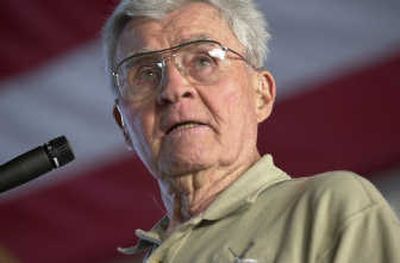Enola Gay pilot dead at 92

Paul Warfield Tibbets Jr., the Army Air Forces pilot whose bombing run over Hiroshima, Japan, in 1945 introduced nuclear war, died Thursday at his home in Columbus, Ohio. He was 92.
Tibbets suffered from a variety of ailments and died of heart failure, said Gerry Newhouse, his longtime friend.
The pilot never apologized for unleashing the devastating explosive force and insidious nuclear radiation that leveled more than two-thirds of the buildings in Hiroshima and immediately killed at least 80,000 people.
To him and millions of supporters, dropping the atomic bomb was a justifiable means of shortening World War II, preserving the lives of hundreds of thousands of American servicemen that military experts said might have died in a final Allied invasion of Japan.
“I never lost a night’s sleep over it,” Tibbets had said.
But to millions of detractors, the nuclear attack on Hiroshima was a cosmic example of man’s inhumanity to man, an act that left the world teetering on the brink of self-annihilation.
“I made one great mistake in my life – when I signed a letter to President Roosevelt recommending that an atomic bomb be made,” said pioneering physicist Albert Einstein, one of the first to conceive of such a weapon.
Tibbets was more than just the pilot of the Enola Gay, the propeller-driven, four-engine bomber, named for his mother, that dropped the bomb on Hiroshima on Aug. 6, 1945.
Described by his commandant, Gen. H.H. “Hap” Arnold as “the best damned pilot in the (Army) Air Force,” Tibbets was hand-picked to command the mysterious 509th Composite Group, the first military unit ever formed to wage nuclear war. Three days after the bombing of Hiroshima, another plane from the 509th leveled much of Nagasaki with another nuclear bomb, prompting the Japanese surrender.
Tibbets chose the planes that flew those missions – specially reconfigured B-29s, then the largest operational aircraft on Earth, stripped of armament and armor plating to lighten them for their extended journeys.
He selected the combat veterans who manned the bombers. Many of the crewmen were personal friends who had flown missions with him over Nazi-occupied Western Europe and North Africa.
Tibbets picked an isolated air base straddling the Nevada-Utah border where the men of the 509th trained for their mission. And he drove his men hard, weeding out those who fell short or talked too much about what they were doing.
Born in Quincy, Ill., on Feb. 23, 1915, he moved to Florida with his parents while still a child. His father, a candy distributor, hired a popular barnstormer, Doug Davis, to fly over Hialeah racetrack as a promotional stunt. The 12-year-old Tibbets rode as a passenger, tossing handfuls of Baby Ruth bars to the crowd below. “From that day on, I knew I had to fly,” Tibbets said.
Tibbets’ father, a believer in discipline, shipped his son off to Western Military Academy in Alton, Ill., the following year. Tibbets liked the military life, and despite subsequent premedical studies at the universities of Cincinnati and Florida, he enlisted as a cadet at the Army Air Corps Academy in 1937.
By late summer 1942, nine months after the Japanese attack on Pearl Harbor that thrust America into World War II, Tibbets was flying some of the first U.S. bombing raids over German-held targets in Western Europe. He also led the bombing runs supporting the American landings in North Africa.
In early 1943, Tibbets was recalled to the United States to begin testing a new bomber, the B-29.
In September 1944, Lt. Col. Tibbets was summoned to a secret military conclave in Colorado, where he was told that he had been selected over dozens of other candidates to head a unit called the 509th Composite Group.
“My job, in brief, was to wage atomic war,” he wrote in his book, “Flight of the Enola Gay” (1989).
Tibbets said he wasn’t proud of all the death and destruction and Hiroshima, but he was proud that he did his job well.
“I didn’t start the war,” he said. “I didn’t do anything except what I was told to do; what I had sworn to do, years before, which is ‘Fight for the defense of this country.’ “
Tibbets is survived by his wife, Andrea; sons Paul III, Gene and James; and a number of grandchildren and great-grandchildren.
Because he feared giving protestors a place to demonstrate, Tibbets did not want a funeral or headstone, Newhouse said. He requested that his ashes be scattered over the North Atlantic Ocean.